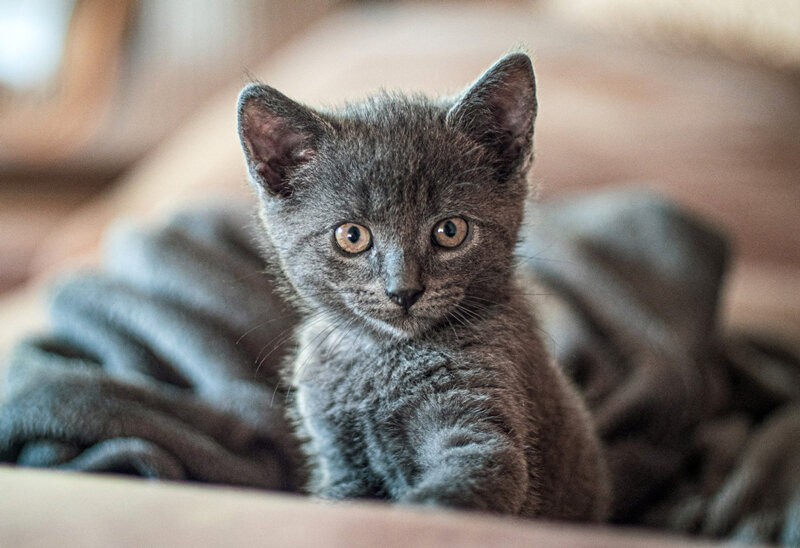Kitten Fundamentals
Welcoming a kitten into the family is fascinating and fun. It also takes humour, tolerance and lots of nurturing. It can be surprisingly exhausting in the early days. Cats make you work hard for their love, but once the bond is made, you’ll be rewarded with an affectionate, loyal snuggling companion.
Some erratic behaviour and nocturnal shenanigans can baffle first-time owners. If it’s your first experience raising an energetic kitten, it’s likely that you have lots of questions. Here’s some guidance for the new folks and those who need to brush up on the basics.
Diet
You can feed cats low-processed, high quality, commercially prepared food (such as ZIWI Peak wet cans) or you can prepare home-cooked or home-prepared raw meals using human-grade meat. Your kitten will also need a supplement to ensure a balanced diet. Ask your vet for advice.
Cats are obligate carnivores, meaning they need lots of raw meat and very little plant-based food.
Domestic cats have evolved from a desert animal that gets its water intake from prey rather than from drinking. It’s important that your cat’s food is reasonably wet and primarily raw.
Although often popular with cats, avoid regularly giving them dry food if you can, as it is highly processed and lacks the essential moisture they need to thrive.
Feed your kitten at least 2 meals a day. With guidance, work out their daily food intake and divide that between the day’s meals.
Hot tip: make sure your cat’s bowl is wide enough that its whiskers fit inside the rim without getting them squashed. Avoid using plastic bowls. Go for ceramic (check regularly for cracks that can trap bacteria) or stainless steel bowls instead.
Get more tips on an optimal diet for your kitten. Be sure to read the noteworthy section on why cats are attracted to running water.
Healthy teeth
Keep your cat’s chompers in good shape by adding a few raw bones a week to their diet. Chicken wings are ideal. The gnawing and chewing action will scrape plaque and food off their teeth. Avoid feeding your cat dry food marketed for teeth care if you can.
If your kitten is feline fussy and chicken wings are not acceptable, try adding a good quality dental health product like Plaque Off for Cats to their meals.
Read more about dental health for your kitten.
Kitty litter
Make sure you have a litter tray inside your home, even if your kitten prefers to do its business outdoors. Save yourself unnecessary clean ups.
Your cat should be able to easily get in and out of the tray and turn around within it. Some cats prefer privacy (aren’t cats glorious) and might respond well to a hooded litter tray.
Keep the tray well away from food, kids and curious dogs. The laundry or bathroom could be ideal spots.
There are many types of litter available. Plant or paper-based litter is safer if accidentally ingested and is gentle on the environment.
Got more than one cat now? You’ll need one litter tray per cat plus one extra. This way you might avoid territorial spats or hygiene-related issues leading to toilet accidents around the house.
Indoors or outdoors?
Cats should ideally be kept indoors, not only for their own protection, but for the safety of native wildlife and other neighbourhood pets. Cats aren’t native to Australia and don’t fit into the local wildlife scene well when their natural hunting instincts drive them out into the night stalking vulnerable prey.
And we all know what a racket a late-night neighbourhood cat brawl can make.
That being said, sunshine and fresh air are important to cats, too. And cats are notoriously independent and persistent in their desire to be free without restrictions. Nor do most of us feel right keeping them cooped up inside 24/7.
The best solution is to keep them indoors at night, out of respect for the wildlife, and let them out during the day. You can try a secure outdoor cat run. You can try a kitty harness and lead (yes, they do exist) if you are game for a challenge. Or you might consider installing kitty-proof backyard fencing that prevents them from climbing over and escaping into the world unsupervised.
A happy kitty
Cats like to feel secure. Setting them up with an indoor hideout for privacy will make your kitten feel safe. Try an igloo-style bed, a covered crate or a cat tower with an enclosed box.
Cats are instinctively drawn to warmth. Keep an eye on them around fireplaces, heaters and cooking appliances.
Put a safe heat source, like a Snugglesafe heat pad, a securely covered wheat bag or hot water bottle, in their favourite sleeping spot. You will have a very satisfied and settled kitten.
Got a scaredy cat?
Cats, by nature, can become nervous or skittish easily. Cats that are prone to getting stressed might benefit from a product that helps them stay calm, such as a spray or diffuser (try Feliway) or oral supplement (ask your vet) that imitates the feline facial pheromone.
These products can be useful during unsettled times like moving house, new additions to the house, vet visits or cattery stays.
Vaccinations
Vaccinations stimulate your kitten’s immune system to produce antibodies that protect them against selected deadly or dangerous diseases.
In Australia, kittens get shots at 6 to 8 weeks old, then again at 10 to 12 weeks and 14 to 16 weeks. This is usually enough to protect them for 12 months.
Titre testing
This is a blood test that checks for certain antibodies in the blood stream. Ideally, titre tests are first performed on kittens 4 weeks after their final vaccination.
The test will show if your pet is immune to a particular disease or needs re-vaccinating. If they have strong immunity, further shots are not necessary as they already have protection.
This knowledge can save your pet’s system from being overloaded with chemicals.
Find out more about vaccinations and titre testing.
Parasite prevention
Overloading your pet’s system with unnecessary chemicals is always a danger. Ringwood Vet Clinic supports checking regularly for the presence of parasites rather than routinely giving your pet drugs they might not need.
Check regularly for worms (send a poo sample to the clinic for testing), fleas, ticks and mites.
If you’ve found proof of parasites, avoid using cheap, harsh treatments sold at supermarkets. Ask your vet or pet store for guidance on gentle and effective products.
Desexing
Ringwood Vet Clinic recommends that all cats be desexed from 6 months of age. This allows your kitten to grow into themselves properly, but protects them (and you!) from unwanted hormonal behaviour such as spraying, prevents pregnancy, and helps reduce the likelihood of sassy neighbourhood cat fights if they are roaming free outside.
Sun protection
White or partially white cats are at risk of sunburn and related skin cancers, especially in exposed pink areas around the ears, nose and eyes.
They will need a gentle, pet-safe sunscreen if they are outdoors regularly. Ask your vet or pet store.
Scratching poles
It’s a very normal part of cat behaviour to scratch surfaces to wear their nails and play. A regular nail trim can help curb the desire to shred your furniture.
Invest in a good scratching post and make it as appealing as possible. Ideas include making it tall enough for your cat to stretch properly, having vertical and horizontal surfaces so they can scratch at different angles, wrapping the post with sturdy thick rope, and having a cosy space somewhere on the structure for perching or hiding.
Put the scratching post somewhere obvious that your kitten will appreciate, not you (don’t hide it in some innocuous corner out of the way).
Look into commercial deterrents that will help protect your house from sharp claws. They are usually sticky or unpleasant for cats to touch or smell. Ask your vet or pet store about suitable products.
Grooming
It’s no secret that most cats don’t like being excessively handled or brushed. Thankfully, they do a wonderful job of grooming themselves. Some cats self-groom for up to 50% of their day!
But later in life, when they become less flexible and able to groom themselves, you might need to give them a hand, especially if your cat has long hair. To make life easier down the track, get your kitten used to being brushed while they are young.
Car travel
It’s illegal and dangerous to travel with your cat unrestrained in a car. You’ll need a cat carrier to secure them so they aren’t a distraction while driving and don’t become a projectile in an accident.
A sturdy box-style carrier with a removable roof can make trips to the vet a thousand times easier. There are many soft carriers on the market, but they can complicate vet visits and are a pain to clean if your cat has a toilet accident (a common scenario if they get stressed in transit).
Microchips
This tiny device is inserted under the skin on your kitten’s back, between the shoulder blades. Each chip has a scannable unique number that stores your contact information. This means vets, shelters, councils and breeders can identify animals and locate owners.
It’s illegal to purchase or adopt a cat in Victoria without a microchip number. If your new kitten doesn’t have a chip, speak to your vet about how to organise one.
You can update your details anytime with Central Animal Records.
Emergencies
You need a solid plan in an emergency. Where will you take your kitten for urgent vet care? What if your regular vet is not available?
Plan in advance for these scenarios as time will be critical. Know the location of your emergency vet clinic and have the phone number handy.
Stay the course for rich rewards
Embrace your kitten’s boundless energy and exhausting curiosity, knowing that they will mellow with age. Remember that advice is never far away and keep your sense of humour on standby as you explore the joys and challenges of rearing a kitten.

